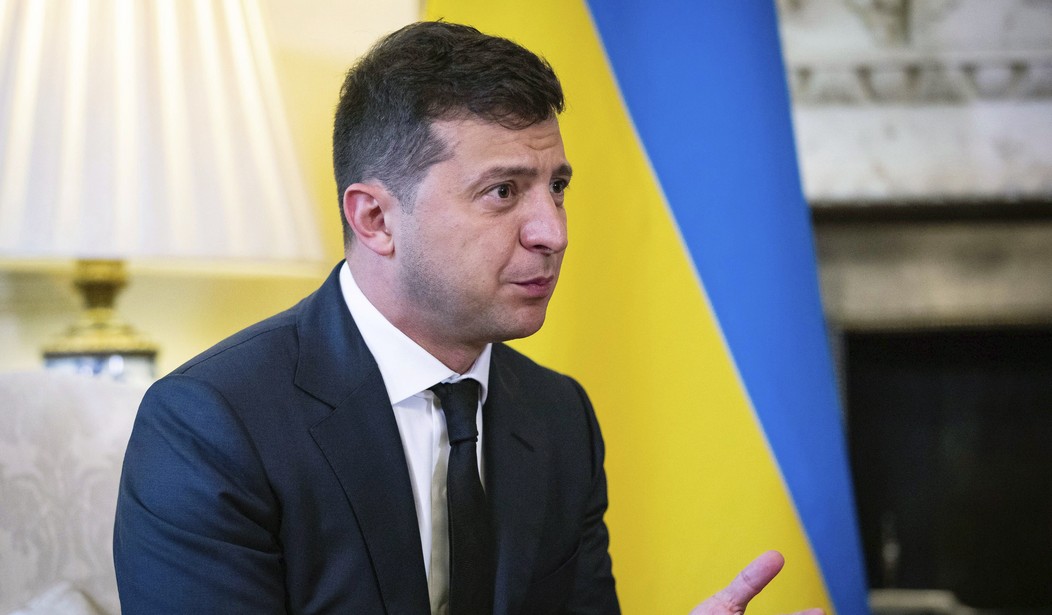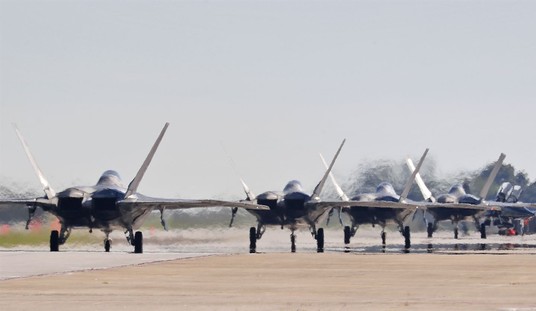The main argument presented by Vladimir Putin for his all-out war on Ukraine certainly sounded strange to Western ears, and especially to Ukraine president Volodymyr Zelensky. In his address to both Ukraine and Russia, Putin insisted that Russian security relied on the “demilitarization and de-Nazification of Ukraine.”
“How can I be a Nazi?” Zelensky replied. Zelensky not only is himself Jewish, but as he pled in return, his grandfather fought for the Russians against the Nazis:
Addressing the Russian public directly and in Russian, his native language, Zelenskiy said: “The Ukraine on your news and Ukraine in real life are two completely different countries — and the main difference between them is: Ours is real. You are told we are Nazis. But could a people who lost more than 8 million lives in the battle against Nazism support Nazism?”
After a pregnant pause, Zelenskiy, who is Jewish — though he did not explicitly say that in the video — added: “How can I be a Nazi? Explain it to my grandfather, who went through the entire war in the infantry of the Soviet army, and died a colonel in an independent Ukraine.”
The Ukrainian president has said that three of his grandfather’s brothers were killed in the Holocaust.
Zelenskiy called on Russians to consider the cost of war and debunked Putin’s talking points.
“What are you fighting for and with whom?” Zelenskiy asked Russians. “Many of you have been to Ukraine. Many of you have family in Ukraine. Some have studied in Ukrainian universities. Some have been friends with Ukrainians. You know our character. You know our people. You know our principles. You know what we value. So listen to yourselves. Listen to reason.”
To Western ears, Putin’s accusation is an absurdity. In the context of US politics, it sounds a lot like the unfortunate impulse to vindicate Godwin’s Law by accusing one’s political opponents of secret Nazi sympathies. Even in Canada, that impulse exists, such as when one MP claimed last week that “honk honk” from protesting truckers was a cryptofascist code for “Heil Hitler.” Adding to the absurdity of Putin’s claim is the fact that Putin is using the same pretexts as Adolf Hitler used to invade and annex other countries — the defense of ethnic minorities supposedly being abused by governments.
However, Putin’s address and justification wasn’t meant for Western ears. It was aimed at Russians and ethnic-Russian Ukrainians with long memories and long grudges from World War II.
In the run-up to World War II, Ukraine — which at the time did not include as much ethnic-Russian territory — had suffered through the Holodomor, a deliberate genocidal famine imposed by Joseph Stalin. The Soviet leader wanted to suppress the kulaks, but more importantly the western-leaning Ukrainians that chafed at the Soviet occupation. Estimates of casualties from the imposed famine of 1932-33 runs as high as 3.9 million. By June 1933, 28,000 people were dying each day, while the Soviets expropriated millions of tons of Ukrainian wheat.
As a result, when Hitler attacked the Soviet Union in his surprise war of June 1941, ethnic Ukrainians rallied around the Germans as liberators — but only at first. Rather than take advantage of the Ukrainian hatred for the Soviets, the Nazis imposed the same racial policies in Ukraine that they imposed on other Slavs in eastern Europe. Still, some collaboration took place among ethnic Ukrainians, and that has not been forgotten among Russians.
The Associated Press notes that this argument is still nonsense from a historical or current-events perspective, but that doesn’t mean it will not be effective:
This goes back to 1941 when Ukraine, at the time part of the Soviet Union, was occupied by Nazi Germany. Some Ukrainian nationalists welcomed the Nazi occupiers, in part as a way to challenge their Soviet opponents, according to Yad Vashem, Israel’s Holocaust memorial. Historians say that, like in other countries, there was also collaboration.
Some of Ukraine’s politicians since 2014 have sought to glorify nationalist fighters from the era, focusing on their opposition to Soviet rule rather than their collaboration and documented crimes against Jews, as well as Poles living in Ukraine.
But making the leap from that to claiming Ukraine’s current government is a Nazi state does not reflect the reality of its politics, including the landslide election of a Jewish president and the aim of many Ukrainians to strengthen the country’s democracy, reduce corruption and move closer to the West.
“In terms of all of the sort of constituent parts of Nazism, none of that is in play in Ukraine. Territorial ambitions. State-sponsored terrorism. Rampant antisemitism. Bigotry. A dictatorship. None of those are in play. So this is just total fiction,” said Jonathan Dekel-Chen, a history professor at Jerusalem’s Hebrew University.
Indeed, but Putin’s argument acts mainly as shorthand for the ethnic conflict that has percolated ever since, and especially over the last two decades. As long as Ukraine’s leadership came from the ethnic-Russian power bases, Ukraine’s independence didn’t much matter to Moscow, either under Boris Yeltsin or Putin. Only when ethnic Ukrainians threatened to take power (and briefly did) in 2004 did Putin start attacking Ukraine. He poisoned Viktor Yuschchenko with dioxin, a technique that made clear who had sent the message and why. When the ethnic Ukrainians managed to return to power in 2014, embraced by the West (and boosted by the West, in Putin’s eyes), Putin escalated the issue by seizing Crimea and effectively partitioning off the ethnic-Russian majority areas of the Donbas.
By framing this as a “de-Nazification” effort, Putin isn’t engaging Godwin’s Law. He’s selling this as a nationalistic defense of ethnic Russians against a longtime “enemy,” even though it has been more than 80 years since any brief flirtation of ethnic Ukrainians with the Nazis. Putin’s betting that he can still sell that to his domestic audience and the ethnic Russians of the Donbas as a pretext for what will likely be a costly war. He may well be right, or right enough, at least for a while.
But for how long? Putin’s endgame appears to be putting ethnic Russians back in charge of Ukraine permanently, one way or the other:
#BREAKING Russia intends to 'decapitate' Ukraine government, install new leadership allied to Moscow: US defense official pic.twitter.com/5KNbphYiMf
— AFP News Agency (@AFP) February 24, 2022
That’s easier said than done, however. The problem with the “decapitation” strategy is that most of Ukraine is populated by ethnic Ukrainians, who might have had their own grudges against Russians before this but certainly will have them now. The only way to keep a Russian government in place in Ukraine is to permanently occupy ethnic-Ukraine territories, or commit a genocidal ethnic cleansing against them to force the remainder to migrate west to give their puppet government enough breathing room.
That’s what Stalin did in 1932-33, for the same and other reasons. Eventually Putin will face the same choice, only without all of the proletarian nonsense that kept the Soviets in power for as long as they lasted. The occupation will be long, bloody, costly, and ultimately as destabilizing to Moscow as was their occupation of Afghanistan.








Join the conversation as a VIP Member